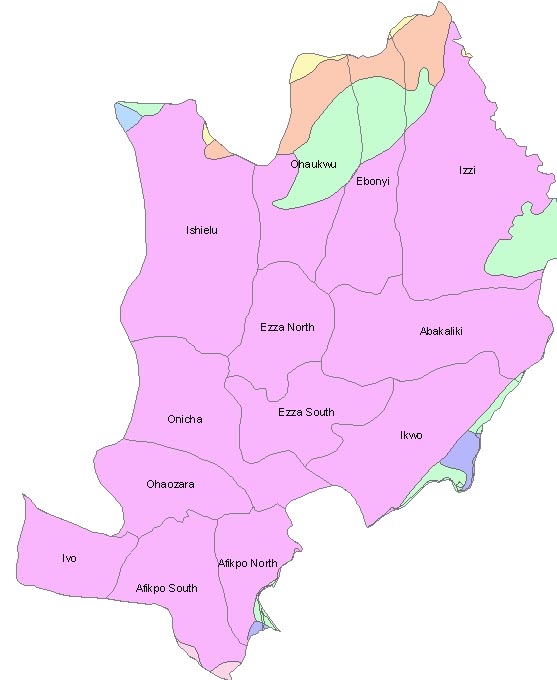Ebonyi State is located in the south-eastern part of Nigeria. The state is majorly inhabited by the Igbo people. The capital city of Ebonyi state is the city of Abakaliki, which is also its largest city. It was one of the six states created in 1996 by the then federal military government of General Sani Abacha. Ebonyi state was created from parts of both the Abakaliki division from Enugu State and the Afikpo division from Abia State. The primary occupation in Ebonyi is agriculture. The state leads in the production of rice, yam, potatoes, maize, beans, and cassava in Nigeria. Ebonyi has several solid mineral resources, including lead, crude oil, and natural gas. The state has few large-scale commercial mines. Ebonyi is called ‘the salt of the nation’ for its huge salt deposit in some of its regions; Okposi and Uburu Salt Lakes. There are also some tourist locations within the state.
Ebonyi state has three senatorial zones, these are:
The Abakaliki division which makes up Ebonyi North and Ebonyi Central senatorial zones
Afikpo division which makes up the Ebonyi South senatorial zone.
The state is home to six prominent higher tertiary institutions, which are:
- Ebonyi State University, Abakaliki (EBSU)
- Alex Ekwueme Federal University
- Akanu Ibiam Federal Polytechnic, Unwana
- Federal College of Agriculture, Ishiagu
- Ebonyi State College of Education Ikwo (EBSCOEI)
- College of Health Sciences, Ezzamgbo

This article covers all you need to know the local government areas in Ebonyi state. Ebonyi has thirteen local government areas. Read up on them below:
Local Government Areas in Ebonyi state
Abakaliki
Abakaliki is the capital city of Ebonyi State. The inhabitants are primarily members of the Igbo tribe. Abakaliki used to be the headquarters of the Ogoja province before the creation of the Southeastern State in 1967. The name Abakaliki originally meant and spelt ‘Aba Nkaleke’. This is the name of a community in Izzi land (Nkaleke).
Abakaliki is a center of agricultural production and trade. Here, you will find an abundance of agricultural products, such as yams, cassava, rice, palm oil and palm kernels. It is also known for mining and quarrying. Abakaliki was an important centre for the slave trade in the 17th century.
Afikpo North
Its headquarters is in the town of Ehugbo, Afikpo. According to the Nigeria 2006 population census, the local government has a population of 156,611. The major language spoken in Afikpo North is a localised form of the Igbo language, which is known as the ‘Ehugbo Language’. The local government has a rich Igbo traditional heritage and culture. Festivals, such as the ‘New Yam Festival’ are held annually in Afikpo.
Afikpo South, Edda
Edda, also known as Edda Egbebu. Edda is home to a culturally distinct people known as the Edda. Edda people are often thought to be a sub-class of the dominant Igbo ethnic group of South-eastern Nigeria. The language of the Edda people has gone extinct. The Edda people currently speak a dialectal variant of Igbo which has many words borrowed from Efik. According to the Nigeria 2006 population census, Edda has a population of 157,072. Agriculture is the major means of livelihood of the people of Edda.
Abakaliki
Its headquarters are in the town of Nkaliki. According to the 2006 census, the LGA has a population of 126,837.
Ezza North
Its headquarters is at Ebiaji town. According to the 2006 census, the local government has a population of 145,619people. Ezza North LGA was created in 1996 along with other LGAs when the new Ebonyi State was established. It is predominantly an Igbo town inhabited by Ezza people.
Ezza South
Its headquarters is Onueke. Onueke serves as a central point for the Ezza community. It is also the headquarters of Ebonyi Central senatorial zone. It was created on October 1st, 1996 with other local government areas in the newly established Ebonyi state. Before the creation of the local government in 1996, Ezza South used to be part of old Ezza local government area. The people are predominantly of Igbo stock. They people speak Ezza dialect and the central Igbo language. Their major occupations are farming and trading. Many also work with the civil service.
Ikwo
It is situated on the eastern part of the state. Ikwo also houses Ebonyi State College of Education, Ikwo. The local government has its headquarters at Onu-Ebonyi Echara. Ikwo shares boundaries with Cross River State.
Ishielu
Its headquarters are in the town of Ezillo. According to the 2006 population census, Ishielu has a population of 151,048.
Ivo
Ivo is home to the Federal College of Agriculture, Ishiagu. Oil pipelines pass through the Ivo area.
Izzi Local government
Izzi is a northeastern Igbo subgroup, located in the south-eastern part of Nigeria. Indigenes of Izzi local government speak the Izzi dialect.
Ohaozara
Its headquarters are in the town of Obiozara Uburu. According to the 2006 Nigeria census, Ohaozara local government has a population of 148,626. The old Ohaozara area includes the present-day Ohaozara and Onicha local government areas of Ebonyi State. The Ohaozara people speak a variant of the Igbo language.
Ohaukwu local government
Its headquarters are in the town of Izhiangbo. As of 2017, Ohaukwu local government has a population of 568,970
Onicha
According to the 2006 census, Onicha has a population of 236,828. Its headquarters are in the town of Isu. Although, there are a number of towns and villages in the Southeastern part of Nigeria that also bear the name “ISU”. But the Isu of Onicha was in Ohaozara Local Government Area Council before the creation of Onicha Area Council. The name of the local government was derived from Onicha Igbo-Eze, a town in Onicha Local Government Area.